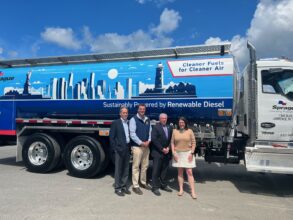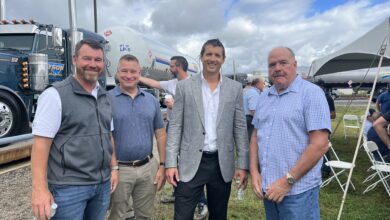Priming the pumps
Feature Story
Peter Cremer North America makes its way to the top of the biodiesel production world
Mike Doll, plant Manager, from the left, Mack Findley, North America sales manager, and Michael Dow, account executive, stand in front of the expansion project at Cincinnati-based Peter Cremer North America, LP. PCNA is adding six 1-million-gallon storage tanks to its biodiesel production plant.
The demand for biodiesel continues to grow every day in the United States. The ability to keep up with that demand while trying to improve efficiencies and uptime is a challenge that all biodiesel producers must continue to refine. Having the correct pumping and storage equipment in place at the production facility is a key component to their success.
No one knows this better than Peter Cremer North America, LP, based in Cincinnati, the first BQ-9000 producer of biodiesel in the United States. As the demand for biodiesel surges, Peter Cremer serves as an example to other producers on how to successfully increase production and uptime. In July 2006, Peter Cremer North America completed an expansion project that made it one of the largest biodiesel producers in the United States with a production capacity of more than 30 million gallons per year.
PCNA began producing biodiesel in 2002 and quickly outgrew its infrastructure in a few years. Knowing the need to grow was imminent, the company mapped out a plan to double its production of 15 million gallons by approving an expansion project in September 2005.
‘We knew we had the capacity to produce 30 million gallons, but we were limited by our infrastructure. The addition of the six 1-million-gallon tanks will give us the storage capacity to hit our production capacity in 2006,” said Mack Findley, North America sales manager for PCNA.
A longtime proponent of biodiesel as a viable alternative fuel, Findley was the first employee at the company hired by its president, Raymond Bitzer, when the company was created in 1999 as an oleochemical services business. The company packages, tests and stores different types of oleochemicals for larger oleochemical producers, and markets crude and refined glycerin, a byproduct during the production of biodiesel. The crossover from oleochemicals to biodiesel was somewhat natural due to similar core competencies.
‘When you produce 100 gallons of biodiesel, you also produce 10 gallons of glycerin. PCNA is a global marketer of glycerin,” Findley noted.
The company has enjoyed rapid growth over the past seven years and currently employs 110 people.
‘Since 1991, I have been saying that biodiesel is the next big thing. So, it’s been a 15-year educational exercise getting everyone to understand the potential and benefits of biodiesel,” Findley said.
Plant Project
PCNA’s original plant design had limitations on storage capacity. The company has storage tanks located near the Ohio River and is building six new 1-million-gallon storage tanks to give the company the capacity to produce 30 million gallons per year. Two of the new tanks hold the soybean oil feedstock that is brought into the facility every day, while the other four tanks are designated for the finished product.
Even though the raw and refined products are located within a few feet of each other, both are being pumped to and from the transesterification production facility via two one-mile-long pipelines. The importance of the proper pumping technology used throughout the plant is critical to its success. Without durable pumps that are easy to maintain, PCNA would not be able to meet its targeted production. The company chose to use vane-pump technology throughout its plant due to the pump’s consistent performance and superior handling ability of thin liquids, such as biodiesel.
‘Our entire operation uses NP2 or NP4 Blackmer Vane Pumps. From railcar loading/unloading, to sending the product to our production building and back to storage, or loading it onto the trucks for delivery, over the years we’ve tried different types of pump technologies, but the vane technology works the best. Some of the pumps might be geared differently in different applications, but these are perfect pumps for our needs,” said Mike Doll, PCNA’s plant manager.
PCNA soybean oil feedstock is shipped into the facility by railcar. The typical railcar coming into the facility holds roughly 20,000 to 25,000 gallons of soybean oil.
‘The railcars enter the plant and are top-unloaded, which is something you probably won’t see anywhere else. The Blackmer vane pumps have such a tremendous suction ability that we are able to load and unload from the same point,” noted Doll. ‘Because of their suction-lift capability and high-performance characteristics, the Blackmer vane pumps enable us to unload these railcars very efficiently.”
After the oil is unloaded, it gets pumped to its production facility via a 1-mile-long pipeline where it’s processed and turned into methyl ester. The methyl ester is sent back to the new storage tanks via a different pipeline and pumped into the new storage tanks.
Meeting Industry Specs
Once the B100 is placed into the new storage tanks, the methyl ester will be blended with additives before being sent out to a third-party testing lab to verify each lot meets the ASTM D6751 specifications. PCNA does several other kinds of testing at its in-house lab for its other industries. PCNA takes great pride in making sure that all of the B100 that is produced in its facility meets all of the proper industry specifications.
‘Not one drop of B100 will be shipped out of our plant before it has been properly tested and approved,” said Findley.
Continuing its commitment to quality, PCNA was the first producer to gain the BQ-9000 producer accreditation for quality in the United States. The BQ-9000 program was intended as a quality philosophy that incorporates ISO 9000 practices with the American Society for Testing Materials D6751 standard for biodiesel. The rationale behind the BQ-9000 program was to promote the commercial success and public acceptance of biodiesel, assure biodiesel is produced to and maintained to ASTM specifications throughout the supply chain, and avoid redundant testing throughout the supply chain.
‘We volunteered to be the first BQ-9000 producer as part of this program because quality is very important to PCNA and the biodiesel industry. We also know that the industry ‘ the automobile and engine manufacturers, municipalities, utilities, etc. ‘ want to make sure that the end product meets a certain specification,” said Findley. ‘The first step you have to do is to review your quality manual and make sure you have a true quality program in place. Once the National Biodiesel Accreditation Commission thinks that you have the right quality system in place, they will come into the plant for a two-day audit. They will review your procedures, records, retains, specifications, data, testing procedures, etc., to confirm that every drop of biodiesel coming out of your plant meets that ASTM.”
In June, Peter Cremer also became a BQ-9000 accredited marketer, meaning that not only is the company producing ASTM D6751-approved biodiesel, but they also deliver it to its customers. Whether it is sold via tanker truck, railcar or by the barrel, the company makes sure each shipment meets ASTM D6751.
‘The infrastructure that’s needed to produce 30 million gallons of biodiesel per year is significant. Not everyone takes into consideration all of the piping, pumps and equipment that’s needed,” said Doll. ‘We selected vane technology for our pumps because of their superior thin-liquid-handling capabilities, seal integrity and uptime performance, and have properly configured our piping and production equipment to provide optimum results.”
Throughout its biodiesel plant, Peter Cremer North America, LP uses NP2 or NP4 sliding vane pumps manufactured by Blackmer.
Targeting Customers
PCNA has worked with many local municipalities to increase the awareness of biodiesel as a viable alternative fuel. By doing so, not only has the company improved customer acceptance, but also increased demand. The company enjoys a solid relationship with the Southwest Regional Transit Authority, Cincinnati’s metro bus company, the single largest transit company user of biodiesel in the United States, according to Findley. The city runs biodiesel blends up to B75 during the summer months, down to B20 blends in the winter. In 2005, PCNA also helped Cincinnati avoid fuel shortages after Hurricane Katrina.
‘Last year after Hurricane Katrina, the city of Cincinnati could not get enough diesel fuel to keep the fleet operational,” explained Findley. ‘They have a big event every year called the Labor Day Fireworks. They called us up and they were out of diesel. They picked up 17 truckloads of biodiesel. We kept the Cincinnati Labor Day Fireworks show running because they ran 100-percent biodiesel in their buses. They had no problems with it and they loved it.”
Following Cincinnati’s lead, the city of Columbus’ metro bus company (Central Ohio Regional Transit Authority) has been running on a blend of B40. However, recently the city’s buses have used a B95 blend with no problems.
Findley also noted that the Jeep Liberty, which is made in Toledo, Ohio, has a diesel engine that is filled with a B5-blended biodiesel before being shipped out to the dealers. PCNA has worked with Jeep to supply the new SUVs all the biodiesel needed for their factory first fill.
‘We will also sell a lot of biodiesel to under-the-rack fuel marketers and jobbers who will blend it themselves to the requests of their customers. We sell to a 300- to 400-mile radius of Cincinnati. We have a unique advantage being on the river. We ship 500,000-gallon barges on almost a weekly basis.” said Findley.
‘Having the right blend is extremely critical to the quality standards of the fuel. Because of this, for blending operations, I would strongly recommend the use of vane pumps to help ensure biodiesel blend quality standards,” recommended Doll. ‘By virtue of their design, they have self-adjusting vanes that ensure volumetric consistency over time. In our experience, other pump types wear over time which can result in blending inconsistency.”
Looking Forward
As states such as Minnesota, Illinois, Missouri and Pennsylvania, to name a few, continue to develop mandates, tax benefits and grants, the acceptance of biodiesel will undoubtedly grow over the next several years. Biodiesel producers like Peter Cremer North America see this as a potential mainstream fuel in the not-too-distant future.
‘I think the first major level you’ll see the biodiesel consumption hit will be 1 billion gallons. The U.S. has roughly 300-million gallons of capacity in 2006. But in 2007 to 2008, the industry is going to build another 700-million gallons of capacity. So, the capacity will be there to create a 1-billion-gallon market, which will be 2 percent of the overall U.S. diesel market. It doesn’t sound like a whole lot, but 1 billion gallons will be a major hurdle. I would say that we could see a 1-billion-gallon market within the next five years,” remarked Findley.
Peter Cremer North America is a Blackmer customer. For more information on Blackmer, or its sliding vane pumps that are used throughout Peter Cremer’s biodiesel plant, please go to www.blackmer.com or call (616) 241-1611.


